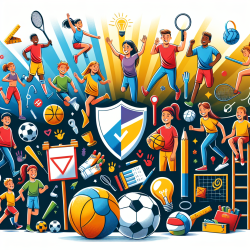Sport participation has long been recognized as a potential catalyst for positive youth development. The research article titled "Sport participation and its association with social and psychological factors known to predict substance use and abuse among youth: A scoping review of the literature" offers valuable insights into how sports can influence psychological and social outcomes that are critical in preventing substance use among youth. This blog aims to explore these insights and provide practical guidance for practitioners looking to enhance their skills or conduct further research in this area.
The Role of Sport in Psychological and Social Development
The scoping review highlights several key psychological and social factors associated with sport participation that can influence youth behavior. These include:
- Self-Concept: A positive self-concept, including self-esteem and a sense of mastery, is linked to lower substance use among youth. Sports can enhance these attributes by providing opportunities for achievement and recognition.
- Self-Regulation: The ability to regulate emotions and behaviors is inversely related to substance use. Sports encourage discipline, focus, and emotional control through structured activities.
- Life Skills: Participation in sports fosters life skills such as time management, communication, and decision-making, which are crucial for healthy development.
- Pro-Social Behavior: Engaging in sports promotes teamwork, empathy, and positive peer relationships, reducing the likelihood of engaging in risky behaviors.
Implications for Practitioners
For educators, coaches, and other practitioners working with youth, the findings from this review suggest several strategies to harness the benefits of sport participation:
- Create a Supportive Environment: Coaches play a pivotal role in shaping the sport experience. Training programs that emphasize supportive coaching practices can enhance the developmental benefits of sports.
- Focus on Skill Development: Encourage skill development that is appropriate to the developmental stage of the athlete. This includes both sport-specific skills and transferrable life skills.
- Promote Positive Peer Interactions: Facilitate environments where positive peer interactions are encouraged. This can help build social capital and reduce negative influences.
- Acknowledge Diversity: Recognize the diverse backgrounds of youth participants. Tailor programs to address specific needs related to race, gender, and socioeconomic status.
The Need for Further Research
The review also identifies gaps in current research that need addressing to fully understand the relationship between sport participation and substance use prevention. Future studies should focus on:
- Causal Relationships: Longitudinal studies are needed to establish causal links between sport participation and reduced substance use.
- Diverse Populations: Research should include diverse populations to understand how different groups experience sports differently.
- Quality Sport Experience: Develop measures to assess the quality of sport experiences and their impact on developmental outcomes.
- Sustained Impact: Investigate whether the benefits of sport participation persist into adulthood.
Conclusion
The evidence suggests that sport participation can positively influence psychological and social factors that are crucial in preventing substance use among youth. However, more research is needed to explore these relationships further. Practitioners can leverage these insights by creating supportive environments that foster skill development and pro-social behavior.
To read the original research paper, please follow this link: Sport participation and its association with social and psychological factors known to predict substance use and abuse among youth: A scoping review of the literature.










